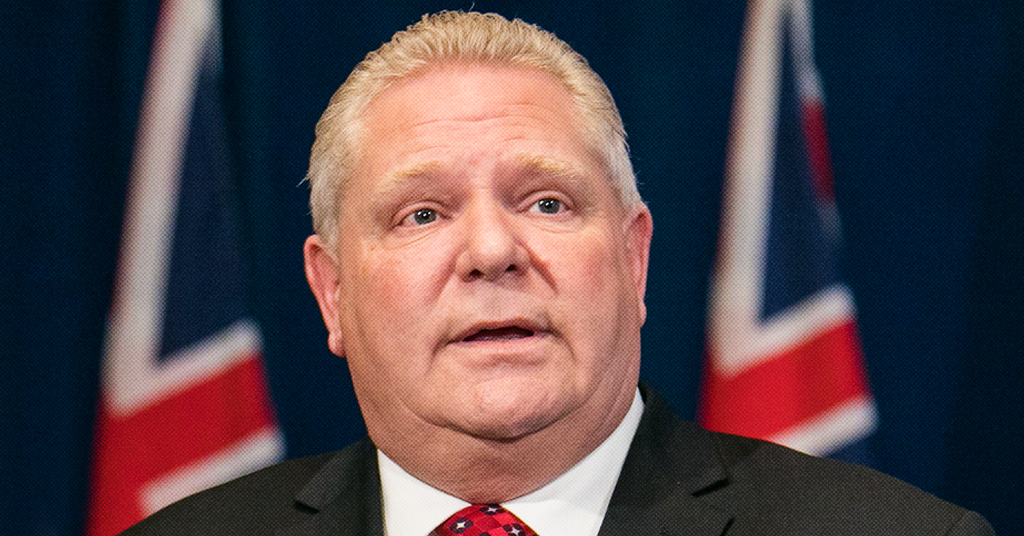
‘Canada Proud’ Donor’s For-Profit ‘Virtual Health’ Service is Lobbying Doug Ford For a COVID-19 Contract
Lobbyist records show private ‘virtual’ healthcare company signed up to lobby Doug Ford’s office about securing a COVID-19 contract
A private, for-profit “virtual” healthcare company has formally registered to lobby Ontario Premier Doug Ford and several top ministers about securing a contract to deliver COVID-19 related health services.
Inliv, a Calgary-based for-profit healthcare company that offers “virtual” health services, is owned by Coril Holdings, a corporation that donated $50,000 to the third party advertiser “Canada Proud” during last year’s federal election, accounting for a big chunk of the right-wing group’s overall funding.
Canada Proud is the federal cousin of Ontario Proud, a group that supported Ontario Premier Doug Ford during the 2018 provincial election.
40% of Canada Proud’s funding has come from one Calgary billionaire and his holding company: pic.twitter.com/cXWuRPjRRa
— Jonathan Goldsbie (@goldsbie) September 20, 2019
According lobbying records from the Office of Ontario’s Integrity Commissioner, Inliv filed a communications report on May 25.
The filing shows the company registered to lobby Premier’s Office to “discuss the provision of services in the digital health care field as they relate to COVID-19.”
According to the filing, the company now has a mandate to lobby ministers’ offices, government ministries, along with Public Health Ontario and Ontario Health.

Office of Ontario Integrity Commissioner
Coril Holdings has a number of links to conservative politics, counting former federal Conservative interim leader Rona Ambrose as one of its directors. Former Alberta Premier Jim Prentice also previously served as a director.
Ronald Mannix, the chairman of Coril’s board of directors, is one of Canada’s top billionaires and financially supported the pro-UCP group Shaping Alberta’s Future along with making an additional $50,000 personal donation to Canada Proud.
Neither Inliv nor Coril responded to requests for comment from PressProgress. Questions to the Premier’s Office and the Ministry of Health also went unanswered.
Inliv’s filings also disclose that Wello, an Ontario-based virtual care company, has a “direct stake” in the lobbying. Wello’s website states: “Both Wello and INLIV are companies under Coril Holdings, a 120-year-old family-owned business.”
A representative of Wello told PressProgress its service is comparable to the virtual healthcare offered by the non-profit, Ministry-led Ontario Telehealth Network but for a fee.
“It’s very similar, except Telehealth, they won’t offer the same kind of service we’re able to offer with that follow up care, analytics into your health, tracking it all in place for you as well as the 24/7 and very quick service in 20 minutes,” the representative explained.
“We are not affiliated with any government bodies,” they added, noting they do not bill OHIP. “We’re private — a private virtual healthcare company.”
He noted the company offers treatment and diagnoses for colds and flus, musculoskeletal issues, prescriptions, lab requisitions and referrals, among others.
The spokesperson said the level of convenience the company offers for a fee is hard to find in the public system, especially during the pandemic: “It’s there to provide that convenience of medical care that, especially during the time that we’re experiencing now has become more valuable as COVID has progressed along.”
This point is echoed repeatedly in the company’s marketing material.
Wello’s CEO noted in a January 2020 news release that “access to timely, quality healthcare continues to be a challenge” and praising the company for its “passion for innovation and a legacy of quality care provision.”
The same has been highlighted by Inliv:
With the healthcare system stretched thin in the fight against COVID-19, INLIV is leading the charge towards using virtual visits to help relieve the pressure on frontline workers. Read more from the @calgaryherald: https://t.co/7pIIfCombv#virtual #primarycare #StayHome
— INLIV (@INLIVCalgary) April 4, 2020
Wello said it charges $35 per month per family for its virtual service, which it notes includes private versions of those offered through public insurance.
While the OTN procures services from “qualified vendors” neither Wello nor Inliv appear to be among them. The OTN’s website also says it is not currently making calls to market or accepting expressions of interest from vendors.
The company has been controversial in Alberta, where it runs a private, for-profit medical clinic. The Parkland Institute described Inliv as one of Alberta’s private boutique “membership” clinics, which provide services not covered by the public insurant for fees — but also offer “enhanced medical care” with faster and higher-quality service to those who pay for it.
Friends Of Medicare has raised similar concerns.
“Inliv is one of those private clinics that we have in Alberta,” director Sandra Azocar told PressProgress. “You can pay membership fees for it and you have access to higher-end healthcare,” something that risks creating a “two-tier system.”
Another company operating in Ontario, Maple, faced similar criticisms for offering virtual, for-profit versions of public health services outside of OHIP and Telemedicine.
Wello was launched in Ontario in July 2018. In early 2019, Inliv CEO Vince Danielsen, listed as both president and CEO of Wello and Inliv, spoke at the University of Toronto’s Rotman School of Management on a panel titled: “How Ontario’s Digital Entrepreneurs Are Creatively Destroying and Modernizing Healthcare.”
Powerful group of #healthcare innovators and #disruptors speaking at today’s @RotmanEvents. How Ontario`s Digital Entrepreneurs Are Creatively Destroying and Modernizing Healthcare.”@VinceDanielsen @geetwello #digitalhealth #startup #RotmanHealthIT pic.twitter.com/E8eKB5HxTr
— Wello – Virtual Healthcare (@getwello) February 13, 2019
Our journalism is powered by readers like you.
We’re an award-winning non-profit news organization that covers topics like social and economic inequality, big business and labour, and right-wing extremism.
Help us build so we can bring to light stories that don’t get the attention they deserve from Canada’s big corporate media outlets.
Donate



